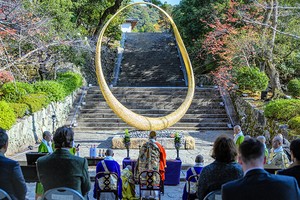By EIJI ZAKODA/ Staff Writer
December 16, 2024 at 18:52 JST
A significant portion of Japan's supplemental budget for fiscal 2022 remains unspent, sparking criticism over the effectiveness and necessity of some of the projects included in the budget.
Nearly 40 percent of the 32 trillion yen ($208.26 billion) budget, amounting to 11.7 trillion yen, was carried over to the following fiscal year, according to the Board of Audit.
For the current fiscal year, the government has proposed a supplemental budget of 13.9 trillion yen, which is expected to be approved soon.
Opposition parties have criticized the proposal, arguing that it is excessive.
Typically, a supplementary budget is created to address unforeseen natural disasters and economic emergencies not covered by the initial budget. It is meant to be spent within the fiscal year.
The 2022 supplemental budget was part of a broader trend of expanding fiscal spending.
Prior to the COVID-19 pandemic, supplemental budgets were typically in the range of several trillion yen.
However, in recent years, amounts have ballooned into the tens of trillions of yen, raising questions about the long-term sustainability of such spending.
The board’s investigation focused on the spending distribution across 1,285 projects that were allocated a portion of the 2022 supplemental budget.
Of those, 197 projects did not happen, leaving the entire 212.7 billion yen set aside from the supplementary budget unspent.
In 355 projects, a total of 8 trillion yen was carried over to the next fiscal year. This includes the entirety of the 3.3 trillion yen divvied from the supplemental budget.
In another 250 projects, a portion of the supplemental funds were used, but a total of 8.2 trillion yen was still carried over.
Only 483 projects were fully executed with no funds left over.
The analysis covered a total spending of 109 trillion yen, including funds from both the initial and supplemental budgets.
Ryoji Fujii, a finance professor at Hakuoh University in Tochigi Prefecture, expressed concerns about Japan’s growing public debt, noting that half of the national budget is financed through borrowing.
“Allocating unnecessary funds and expanding the budget scale can weaken fiscal discipline,” he warned.
He also questioned the effectiveness of the recent supplementary budgets in stimulating the economy.
“The supplementary budget must be designed to spend money in effective and productive ways,” he said.




















A peek through the music industry’s curtain at the producers who harnessed social media to help their idols go global.
A series based on diplomatic documents declassified by Japan’s Foreign Ministry
Here is a collection of first-hand accounts by “hibakusha” atomic bomb survivors.
Cooking experts, chefs and others involved in the field of food introduce their special recipes intertwined with their paths in life.
A series about Japanese-Americans and their memories of World War II